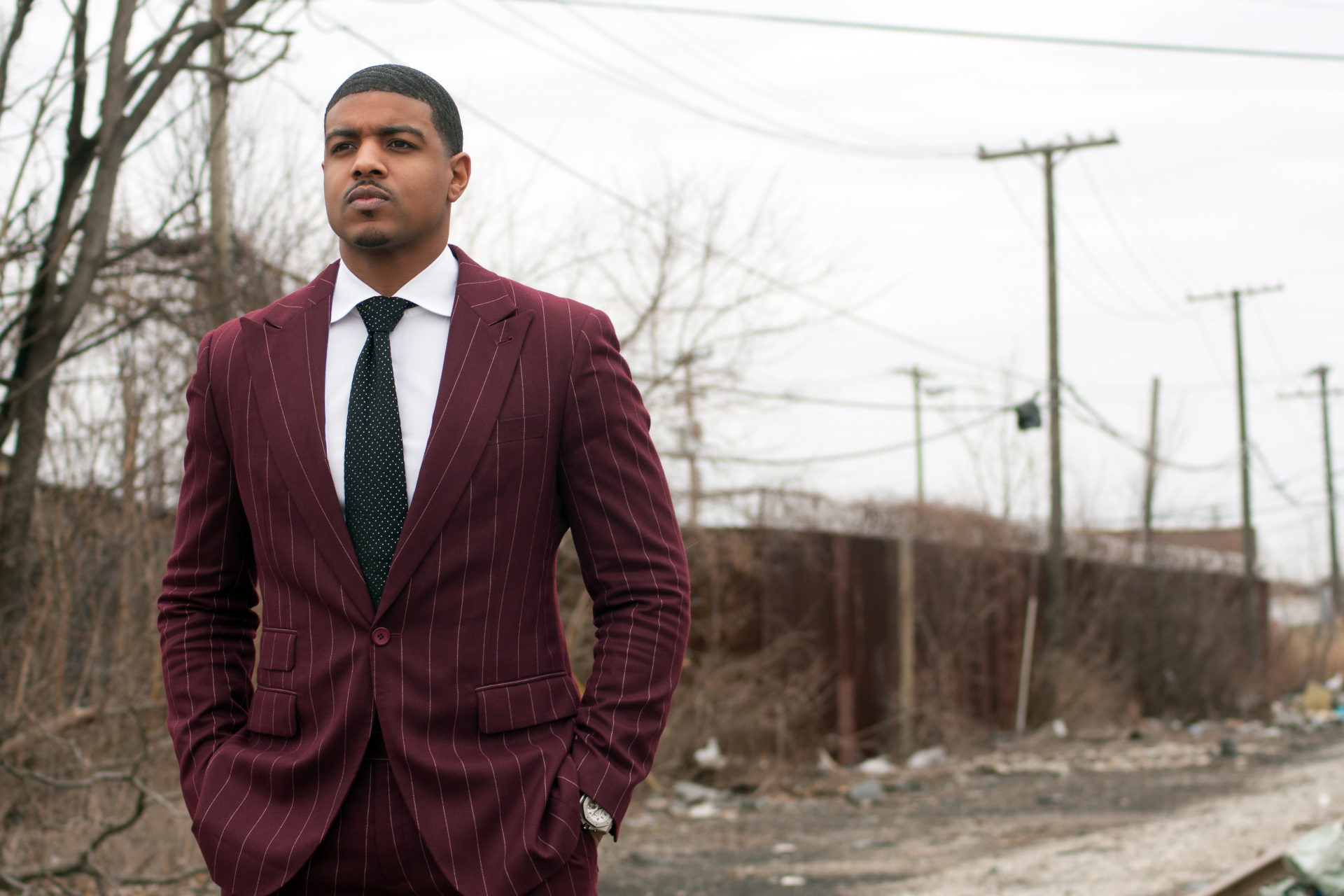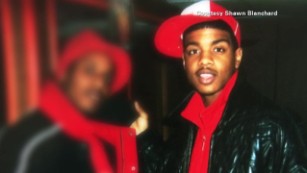“My first mentors were two of my older brothers,” writes Shawn Blanchard. “One was murdered in adrug transaction, while the other is currently serving life in a Federal Prison for allegedly being one of Detroit’s most notorious drug lords. After losing my brothers to violence and prison I was forced to seek alternative mentors, find myself, and simply do something different.”
Brought up in an environment in urban Detroit where the navigation of life was left up to your own experience and hopefully, a stronger sense of judgment, Shawn Blanchard was all too often offered the easiest, yet most destructive paths. A handful of familiar reinforcement and a few of what he likes to call ‘Really Good Bad Examples’ later, Blanchard has emerged as a community-oriented jack-of-all-trades.
Introduced to trying hardships from birth, Shawn Blanchard was born to a mother who’d fallen into the pit of the nation’s crack epidemic and into an environment where all roads seemingly led to a place that was nowhere near where he is now.
Graduating from the University of Michigan with a degree in Mathematical Economics, Blanchard went on to become a high school math teacher in New York City, founding a mentorship program for young men–establishing his true calling: serving as a mentor to younger men who find themselves in the same situations in which he grew up—making it his life’s purpose to continually inspire while bettering himself along the way.
Fresh off the release of his aptly titled How ‘Bout That for a Crack Baby: Keys to Mentorship & Success, Shawn offers us insight into his journey and the ways of thinking and self-reflection that have gotten him this far.
You once said that you believe we should all “Live to Inspire” and your book spends a bit of time focusing on the individuals who inspired you in one way or another. For those unfamiliar with your story, how do you manage to consistently apply that mantra to your daily life?
When you read the book you will notice that I’m extremely reflective. Not only am I reflective on what I do in the world, but I’m also reflective about what influences me at all times.
When we understand what influences us, we can begin to truly find a sense of peace and understand our influence on others. Influence breeds inspiration, and inspiration is the key to life whether we’re receiving it or giving it.
We just need to tap into our source to make sure we’re being purposeful with the inspiration that we’re giving and receiving.
What would say were the most critical moments in your life that projected you towards the path you’re currently on?
Every moment that occurred in my life that would have seemingly broken the average person were the moments that have projected me towards the path I’m on today. It was those moments such as my parents not being around, my grandmother passing away, the death of my siblings, the death of my father, and my siblings going to prison.
Every waking moment where there was something bad that took place, these moments were simply shaping me to have the mindset that I have today. I believe that life is only 10 percent of what happens to us and 90 percent of how we respond to these occurrences and our attitudes towards them.
 You often speak on the “Really Good Bad Examples” and embracing the good in bad situations. Where did that ultimate source of inspiration stem from for you?
You often speak on the “Really Good Bad Examples” and embracing the good in bad situations. Where did that ultimate source of inspiration stem from for you?
It stems from one particular situation—my grandmother’s death. I recall my grandfather never having a bad day in his life. That meant that some days were simply good and other days were simply excellent. It was a matter of perspective in which he unknowingly taught me on a daily basis.
When my grandmother died, I recall him waking up as if it was a regular Thursday. This was a woman who he was married to for 30 years. When I shed tears, he reprimanded me and told me that the reality of the situation was she’s never coming back. I would often think to myself ‘how can this man stay so strong?’ I wanted to adopt that in my life, so ever since then that’s exactly what I’ve done.
It’s all about perspective. This thinking segued into seeing the good in all situations. From my grandmother’s departure., I gained independence and embodied all the lessons that she taught me. I began paying attention to a series of people such as family member and friends seeking guidance.
At times I was given bad examples that I managed to flip. I may not have known what to do, but I knew exactly what not to do.
What are some of your own mistakes you’ve worked to avoid with the young men you’ve taken under your wing?
The concept of deciding who we allow to influence us is a key component in my teachings! In life, we’re all mentors, and we’re all mentees. Meaning, we’re all learning from someone and we’re all teaching someone.
So, it’s a matter of making sure that we choose our influences wisely. We must make sure that those who we allow to mentor us, whether it’s directly or indirectly, are shifting our lives for the better. There was a point in my life where I didn’t choose my influences wisely, so I work hard to make sure that my mentees choose better than I did.
What has been the most difficult aspect of being a mentor?
Understanding that you can’t save everyone, and that you’re not supposed to. Most often we think that as mentors we’re required to create ‘rock stars’ out of our mentees. When in reality we’re simply supposed to make them better than they would have been without us.
Among your many titles you have served as Director of Youth Services for the city of Detroit and as a liaison between Detroit and the White House for the “My Brother’s Keeper” program. In these roles, what are some of the initiatives that you’ve taken and implemented that you’re most proud of?
I had the opportunity to lead the youth employment initiative during the summer of 2015 where we hired approximately 5,600 youth throughout the city of Detroit. Additionally, I launched a citywide elementary soccer league that catered to approximately 600 youth.
Although I‘m very proud of these initiatives, I’m most proud of a very small mentoring program through Big Brothers, Big Sisters that I was able to embed in the mayor’s office. Twice a month, middle school students had the opportunity to visit the mayor’s office, each paired with a mentor that were directors or appointees of some sort.
They were able to interact with city government and got to see that the same people they see on TV were very tangible and down to earth—real people just like them. That was the most amazing project, though it was the smallest, it was the most impactful.
You’ve spoken across the country on many platforms. What or who would you say has been your most meaningful audience?
After speaking at the Indiana Tech NSBE Conference (National Black Engineers) I recall a 20-year-old Black male who came up to me and said “Sir, I can see my life in your testimony. You’re enabling me to understand that I can do anything because if you can do it, I can do it because you’re just like me.” I simply replied, “That’s right, I’m no different than you.”
Right after him a 70-year-old white man approached me and said, “Young man, you’re the most prolific speaker I’ve ever heard in my life”. I thought about it and said ‘Wait a minute, sir. How old are you?’ He said ‘70-years-old’.
I told him that I was flattered, but he couldn’t be serious, not about his age, but about me being one of the most prolific speakers he’s heard. In his time he has heard Dr. King and Malcolm X speak, and if he thought I was the most prolific, maybe he wasn’t listening to them or he was telling me something I didn’t know.
The difference between the 20-year-old Black male and the 70-year-old white male really let me know that I was capable of reaching all generations regardless of age or ethnicity. It let me know that I was walking and serving in my purpose which is why this was such a meaningful experience for me.
In your book, you cite President Barack Obama and former Detroit mayor Kwame Kilpatrick as men you’ve looked up to along the way. In 2016, who would you say is serving as a mentor to you?
Barack Obama still serves as a man that I look up to. Additionally, I would also say John Hope Bryant who is the CEO of Operation Hope and Bryant Motor Sports; and Gail Perry Mason, a mentor mother of mine who is a financial coach and serves on financial boards for the president of the United States, and teaches financial literacy at her money camp for youth.
These three people serve as mentors to me, and as a matter of fact, two of the three wrote recommendations for the back of my book.
It’s certainly clear you’ve traveled a trying journey to get here. But, what are some things that you constantly work on to continue to grow?
The concept of learning! Every day there are lessons being taught, but some of us aren’t learning. So, I like to make sure that I’m actively learning throughout the day and taking lessons from everything to make sure my next day is better than my last.
It’s a matter of practicing what I preach. Individuals, ideals, and society are constantly mentoring us, so we have to be very conscious of the influences in our lives, making sure that we take advantage of both the positive and negative lessons.
It’s important that we take wisdom from the bad and the positive so that we’re able to continue to do good in the world.
You can keep up with Shawn on Facebook, Twitter, and Instagram.
His book is available for purchase via www.IamShawnBlanchard.com

 drug transaction, while the other is currently serving life in a Federal Prison for allegedly being one of Detroit’s most notorious drug lords. After losing my brothers to violence and prison I was forced to seek alternative mentors, find myself, and simply do something different.”
drug transaction, while the other is currently serving life in a Federal Prison for allegedly being one of Detroit’s most notorious drug lords. After losing my brothers to violence and prison I was forced to seek alternative mentors, find myself, and simply do something different.”